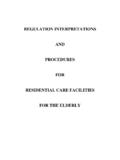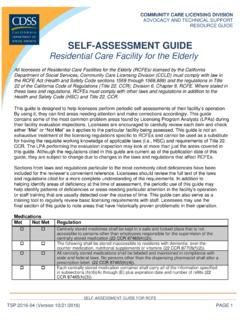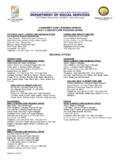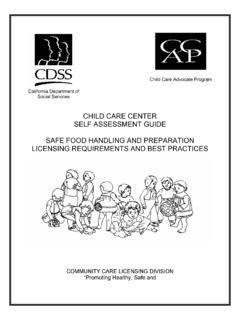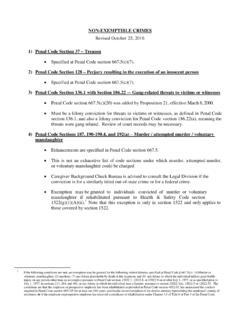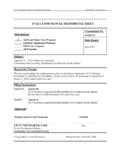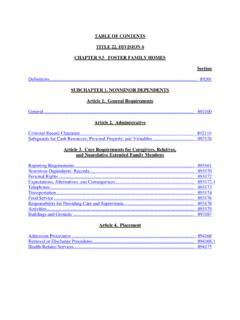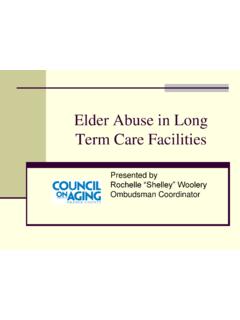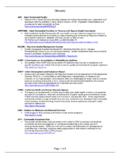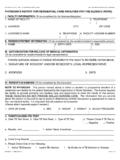Transcription of Adult and Senior Care Program Centralized …
1 Adult and Senior care Program Centralized Application unit (CAU) 1 | P a g e Frequently Asked Questions 1. What is the licensing process? When the Department of social services (CDSS), Community care Licensing Division (CCLD), Adult and Senior care Program (ASC), Centralized Application unit (CAU) receives an application, the application is entered as received into our database and the assigned CAU Analyst makes contact with the applicant via telephone within the first 5 days of receipt of the application. The purpose of the contact is for the assigned CAU analyst to introduce himself/herself to the applicant, informs the applicant of the application process, conducts a quick review of the application for obvious missing documents and inquires about any special circumstances ( , construction, termination of a lease, etc.)
2 That may require priority processing or additional coordination with the Regional Office staff. Additionally, the analyst will submit the request for the fire clearance, bank verification of funds clearance and, if appropriate, mail notification to the board members and county or city planning for overconcentration. The analyst will conduct a thorough review of the entire application. Upon completion of the review, the analyst will then generate and mail to the applicant a letter identifying areas of the application that need correction and/or clarification. The analyst will also call the applicant to let them know the review is complete and schedule Component II and Component III. Upon receipt of an approved fire clearance, the analyst requests that the ASC Regional Office schedule a pre-licensing inspection and Component II face to face meeting.
3 In cases where the applicant has other facilities, a review is conducted for any outstanding penalties or fees and compliance history is reviewed and considered before licensing the new facility. Once all outstanding issues are resolved with the application, the analyst will forward the application to the manager for review. If there are no outstanding issues or concerns, the facility will be licensed. 2. What types of Orientations must I attend? The licensing application process is facilitated by a three step component orientation process. The applicant must attend all three orientations and the administrator must attend Component II and III orientation. An applicant includes any individual, firm, partnership, association, corporation, or limited liability corporation. If the applicant is a limited partnership, only the general partner(s) is required to attend.
4 If the applicant is a 2 | P a g e limited liability corporation or a corporation, the individual authorized or designated by the board resolution or articles of incorporation is required to attend. If the applicant is a corporate entity with no designated authority to an administrator, the CEO, COO, managing member/director or the like must attend. Component I. A category specific orientation session which includes an overview of the licensing Program , including the laws which govern the Program s inspection and enforcement authority, a description of facility types and a discussion of client populations, a brief explanation of compliance, monitoring and administrative issues and a complete review of the application process, the application required and corresponding regulations. An applicant who has completed a Component I orientation for a specific facility category is not required to attend a new Component I orientation if the new facility they are applying for is the same category.
5 Written proof of prior attendance must be included with the application. The applicant will be required to attend Component I, Component II and Component III orientations. In addition, the designated administrator/director, if different than the applicant, must attend Component II and Component III. Component II. This is an interview with the applicant and the designated administrator/director, if different than the applicant, to discuss the application packet and to ensure that the applicant and designated administrator, or director, understands and is capable of providing the services outlined in the facility Program submitted and possesses a basic understanding of statutory and regulatory requirements. Component III. A category specific session of requirements and regulation review, with an emphasis on the facility operation and commonly found problem areas.
6 This session will provide the soon to be licensee with sufficient information to operate the facility within substantial compliance, as well as how to avoid common problem areas or pitfalls of a facility operation. 3. How long does it take to get a license? The Department s goal is to license a facility within 90 to 120 days. However, there are a number of variables that can affect this timeframe. The variables include securing an approved fire clearance, meeting overconcentration requirements, if there is 3 | P a g e construction, obtaining criminal record clearances, and Licensing staff's workload priorities. 4. What is a pre-licensing inspection? Once an approved fire clearance is obtained, the Licensing Program Analyst will schedule an appointment with the applicant to inspect and tour the facility to ensure the facility meets licensing requirements prior to licensure.
7 In some instances a follow-up inspection may be necessary to ensure corrections for compliance have been completed prior to licensure. 5. What type of experience do I need prior to submitting an application for a licensed residential care facility? To be a licensee of a residential care facility needs the commitment to care for the residents and the knowledge of applicable laws and regulations. Both California Health and Safety Code and the California Code of Regulations, Title 22 requires a licensee, whether an individual, partnership, limited liability corporation, or corporation, to be accountable for the general supervision of the licensed facility, and for the establishment of policies concerning its operation. Therefore, best practices recommend an applicant is familiar with all aspects of the care industry, including requirements and responsibilities of advocates, medical personnel, placement agencies, governmental jurisdictions, CCLD, and appropriate accounting policies.
8 Once licensed, an applicant is required to hire and maintain specific qualified personnel, such as an administrator and activities director. Effective January 1, 2016 an applicant for a Residential care Facility for the Elderly must complete 80 hours coursework through an approved vendor for a certification Program and successful completion of the state-administered examination for administrator. Exception to this would be if the applicant completed an approved certification Program within the prior five years or was initially licensed prior to July 1, 1989. If the applicant is a firm, partnership, association, or corporation, the chief executive officer, or other person serving in a like capacity, or the designated administrator of the facility, shall provide evidence of successfully completing an approved certification Program .
9 4 | P a g e 6. Do I have to hire an administrator prior to licensure? Although the applicant does not have to actually hire an administrator at the time the application is submitted to the Centralized Application unit , the applicant must identify and submit documentation on the proposed qualified administrator who will be hired prior to licensure. Please refer to the specific facility category regulations for the specific qualifications. 7. Can a licensee be an administrator? Yes, provided that the licensee meets the category specific administrator certification and qualification, is able to adequately manage and train staff, and can ensure compliance with regulations. 8. Can I turn in my application before getting my administrator certificate or hiring a qualified administrator? Yes, however, the facility will not be approved for licensure without written proof of the administrator certification for licensee or verification that a qualified administrator was hired.
10 9. Can I submit an application prior to securing a facility property? No, a facility address must be identified on the application. 10. Do I have to own the facility property? No. An applicant can own, lease or have a long term rental agreement on the facility property. Any change in the property ownership may affect the validity of the license. If the facility is leased or rented, the agreement must include that the owner acknowledges that the property will be used for a community care facility. The applicant is required to maintain control of property at all times. 5 | P a g e 11. Why does the application process require an owner s information for leased or rented properties? Licensing staff may need to contact a property owner if there are questions or conflicts regarding the lease agreement as to California Code of Regulations requirements or resident protections.
